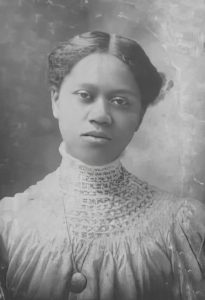
Photo info ...
Carrie Barnes, ca. 1910s Credit: Susan Ross via IndyStar View Source(Apr. 20, 1883-Apr. 26, 1918). Carrie Barnes was born in Kentucky to Lillie Peters and Charles Henry Barnes. When she was young, she moved to Denver, Colorado, with her mother, grandmother Caroline Peters, and sister Pearl. At the age of 10, Barnes joined the Plymouth Congregational Church in Denver, where she worked in the Junior Endeavor, a Christian-based program for boys and girls aimed at training them for church service. She remained in Denver until her graduation from Denver High School in 1902.
Following high school, Barnes received a scholarship to Columbia University in New York. She graduated from its Teachers College in 1905. She then taught at Tuskegee Institute in Alabama for three years before moving to Indianapolis to teach English in the .
When the first group for Black girls was formed in Indianapolis, Barnes became the group guardian. She was a member of the Second Christian Church () and also served as secretary of the Indianapolis .
On June 25, 1912, in the home of , at 640 North West Street, Barnes became one of the founders of Branch 7 of the Equal Suffrage Association. Between 30 and 40 Black women and men met to organize the first all AfricanAmerican-led suffrage organization in Indianapolis. Prominent attorney and social activist called the meeting to order and presided over the election of the organization’s officers. Barnes was elected president and served as chairperson of the branch.
Having grown up in Colorado where women gained the right to vote in 1893, Barnes wanted to see women in Indiana vote as well. She recognized common concerns of Black and white women regarding the vote, child labor laws, and temperance. But Barnes understood that gaining the right to vote for Black women could have an impact on many more issues, which made it more urgent. They faced racial discrimination and were not only wives and mothers but also working women whose lives were affected directly by employment issues and labor regulations. “We feel that colored women have need for the ballot that white women have,” Barnes wrote, “and a great many needs that they have not.”
As president of Branch 7 of the Equal Suffrage Association, Barnes organized monthly meetings at venues such as the , the , and to discuss organization business and to educate Blacks in Indianapolis about the equal suffrage movement, as well as to listen to outside speakers. Barnes met regularly with other branches of the Equal Suffrage League to go over pressing issues and spoke at meetings with male representatives from trade unions to solidify a coalition of Indianapolis residents from all walks of life in support of women’s right to vote.
Barnes married dentist Hubert Heaton Washington Ross in June 1916 and moved to Boston where he had a dental practice. She continued her activism for women’s suffrage as well as for education. She died there from complications of childbirth.
On January 16, 2020, Rep. Susan W. Brooks of Indiana in the United States House of Representatives recognized Barnes for her suffrage work. Brooks lauded Barnes for recruiting Hoosier women from all ethnic, socioeconomic, and religious backgrounds to increase the call for equality and opportunity for all women.
FURTHER READING
- Bowling, Jean. Biographical Sketch of Carolyn “Carrie” Barnes (Ross). Alexandria, VA: Alexander Street, 2020. https://search.alexanderstreet.com/view/work/bibliographic_entity|bibliographic_details|5075756.
- Morgan, Anita. “”A Great Many Needs”: Black Women Suffragists and Voters in Indiana.” Indiana Magazine of History 118, no. 4, 2022: 276-301. https://muse.jhu.edu/article/874574.
CITE THIS ENTRY
APA:
Verderame, J. A. (2022). Carolyn (Carrie) Barnes. Encyclopedia of Indianapolis. Retrieved Feb 15, 2026, from https://indyencyclopedia.org/carolyn-carrie-barnes/.
MLA:
Verderame, Jyoti A. “Carolyn (Carrie) Barnes.” Encyclopedia of Indianapolis, 2022, https://indyencyclopedia.org/carolyn-carrie-barnes/. Accessed 15 Feb 2026.
Chicago:
Verderame, Jyoti A. “Carolyn (Carrie) Barnes.” Encyclopedia of Indianapolis, 2022. Accessed Feb 15, 2026. https://indyencyclopedia.org/carolyn-carrie-barnes/.

Help improve this entry
Contribute information, offer corrections, suggest images.
You can also recommend new entries related to this topic.